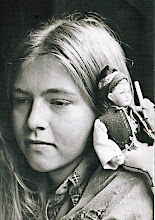These cards belong to
Pamela Gerard, who has a wonderful blog on mail art and sent me these to post. The story of these postcards also involves the story of how I got to know Pamela. We did not meet in the Himalayas. Here are the postcards -story to follow.
According to Wikipedia, the Pindari Glacier trail provides for a 90 km (56 mile) round-trip trek that most people find comfortable to complete in five days. Notice William Archer's fancy initials there on the left. I wonder which one of these fellows is Archer. I assume that Archer was the author of
India and the Future, published by Knopf in 1918. I am also guessing that William George Archer (1907-1979), expert on Indian art, was his son.
Here are the backs of the cards, sent by Archer from Calcutta, 15 Park Street, top flat, and the Calcutta YMCA, by W. Archer.
Now, more on Pamela, the owner of these fabulous cards: Pamela lives in San Francisco and has a fondness for Chinese and other Asian restaurants. I asked her for some San Francisco restaurant recommendations, and she mailed me menus and commentary. Then, somehow, we started exchanging music CDs. And then recently, I received an email from my friend Susi in Germany who had read something about Pamela and thought I might be interested:
This all made me think of you!
Check out "Wait a minute, Mr. Postman":
http://www.vormirdiewelt.de/?category_name=sanfrancisco&paged=2
Pamela was becoming famous in Germany. Who knew! Of course I replied that I already knew Pamela, and I asked my friend how she had learned about her.
My German friend responded:
I follow "Vor Mir Die Welt" and read her post mentioning Pamela.
Meike (VMDW and a journalist) won €500,000 on the German version of Who wants to be a Millionaire and is traveling the world (12 months, 12 cities). I got onto her, because another journalist (bro. of a friend in Munich) is traveling through Germany on foot from South to North and stayed with us one night. He told me about his friend Meike...
It just goes to show you that there are a lot of connections made through the blog world.
Speaking of that, you can make all sorts of good connections with the past and present over at
Sepia Saturday. 



